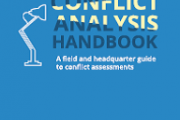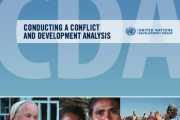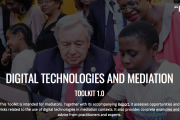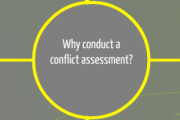Conflict Analysis
Mainstreaming Gender in Conflict Analysis
It is a well researched and acknowledged fact that conflict affects men and women differently. When analyzing the causes, actors, impacts and dynamics of a conflict, it is imperative to understand gender and how it links to peace and conflict, which in turn is key to designing inclusive and effective peacebuilding interventions. Gender-sensitive analysis assesses underlying gender dynamics – political and economic power dynamics between men and women within a society – and their links to peace and security. It should result in identifying opportunities and capacities for inclusive peacemaking. It can also reveal how relations of power are (re)produced by social processes, such as peace talks, and other peace and security decision-making processes, which often exclude women.
For example, women often play key roles in relation to peace and conflict but many of their contributions go unnoticed, or are undervalued and unsupported. A gender-sensitive conflict analysis can shed light on these efforts and may help identify obstacles to participation peacemaking and conflict resolution efforts.





